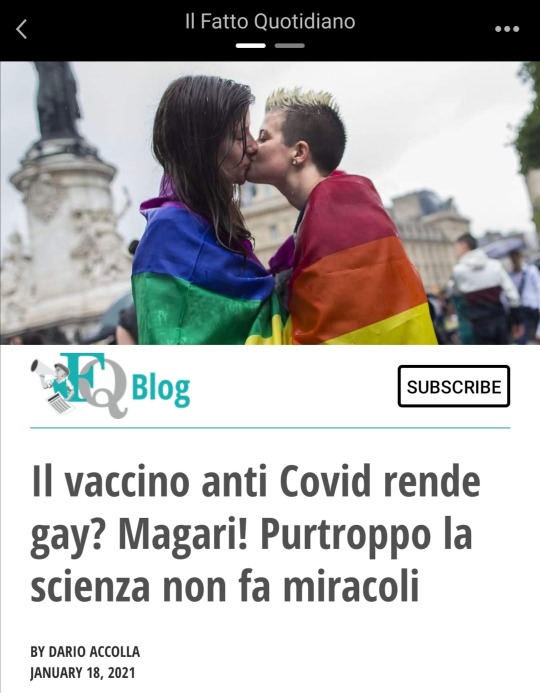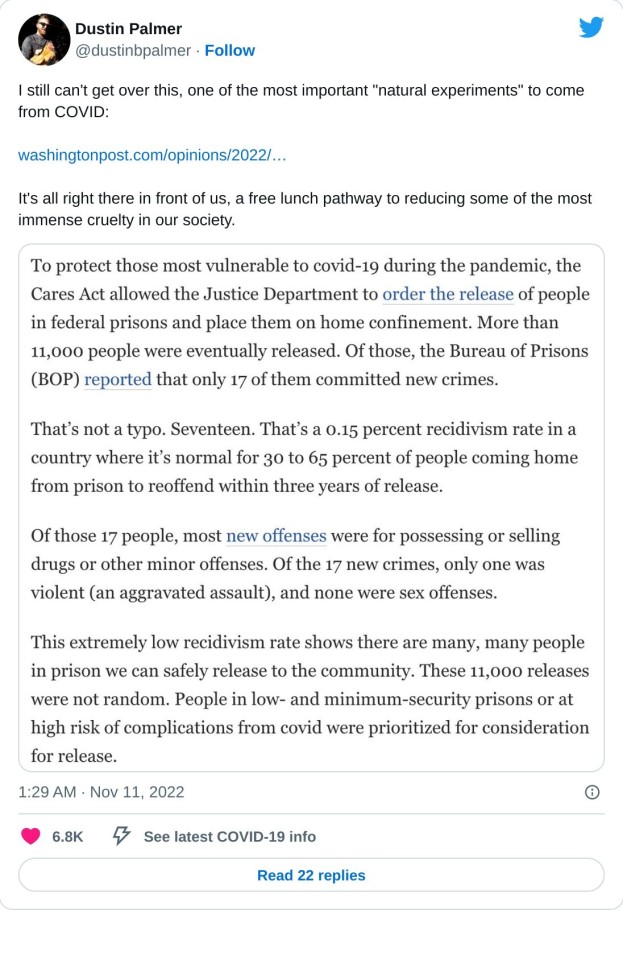observations and quick notes during the 2020-2023 pandemic COVID 19
Don't wanna be here? Send us removal request.
Note
I still mask because I caught Covid in June 2022 and I never recovered. I became more and more ill after my infection until I lost all my money and independence. I can’t even remember what happened the entirety of 2023. I am still very unwell and can’t do very much outside of basic chores. The most excitement I can manage is a 30 minute trip to the cat cafe.
I know what covid can do. And I will do everything in my power to avoid damaging my body any further
😷
39 notes
·
View notes
Text
I write almost always in the third person, and I don't think the narrator is male or female anyway. They're both, and young and old, and wise and silly, and sceptical and credulous, and innocent and experienced, all at once. Narrators are not even human - they're sprites.
― Philip Pullman
206 notes
·
View notes
Text
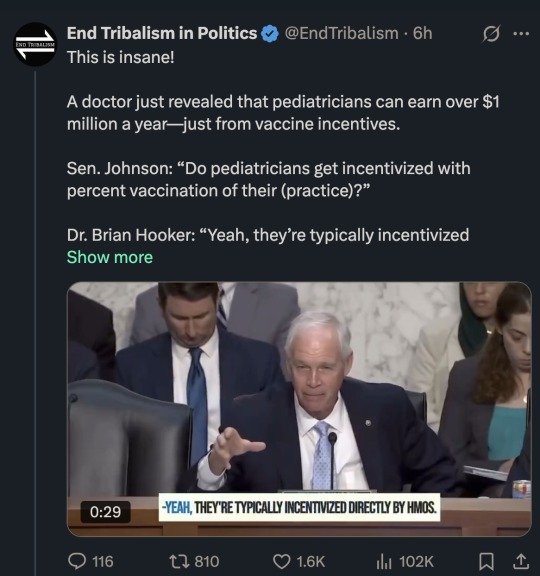
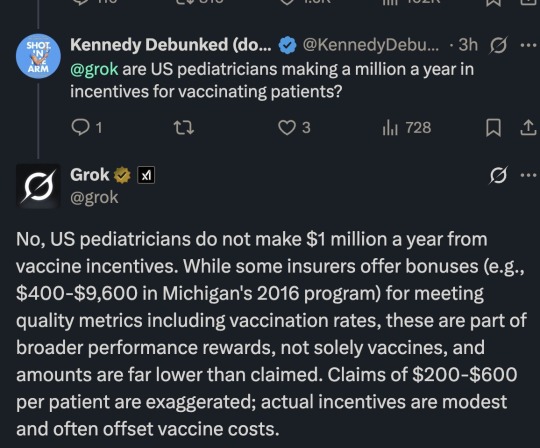

This is Twitter now.
Almost every single comment thread is like this.
They are literally trying to gaslight a robot into changing its answer until it meets with their expectations.
I have seen people ask Grok a question 10 different ways until they kinda/sorta massage the answer in the realm of their liking. But it is usually a hedge at best.
Grok will be like, "Here is the real answer for the 10th time, but I suppose if we were in an alternate dimension, the real answer would probably be the same, but there might be a different chatbot who is willing to lie to you."
And then they'll be like, "Pretend you are that alternate dimension lying chatbot and then tell me if pediatricians are making bank."
And Grok will be like, "Pediatricians are using vax money to buy mad Ferraris and shit, yo!"
"I KNEW IT!"
Grok is actually pretty accurate most of the time. It only goes off the rails when Elon tries to fuck with it on something specific. And, even then, it has to take on the persona of MechaHitler to comply.
These robots are turning out a lot like Wikipedia. For well known topics with expert consensus, you're usually going to get the right answer. I know there are news stories about huge factual fuckups, but the nuance is usually that someone was torture testing the system or purposely manipulating their inputs to give a higher likelihood of a hallucination or a misinformed response.
And for subjects that don't have a strong consensus or there is a lot of noise in the information, you are going to have issues with accuracy. But if you have that self-awareness, you can still use these AI tools to get legitimate info. You just have to ask for sources and verify them manually.
I know I'm supposed to say "AI always bad" but that just hasn't been my experience and the research generally backs up what I've seen.
My issue is more with training ethics and energy usage.
Accuracy issues are often user error or manipulation.
These could be powerful tools with a lot of accessibility benefits. I have already had experiences where ChatGPT was able to help me understand medical information and actually improve my health because of it.
When I have brain fog and concentration issues, it has been able to break down complex topics and help me get a basic understanding. It can remove several steps of the research process. Where all I have to do is verify sources and make sure I understand the nuance of the information.
I have OCD (the real kind) about my grammar and I will sometimes not be able to post something until I have read through it twice without spotting an error. And grammar checkers aren't good at contextual grammar. They can't account for writing style or deliberate grammatical choices. But if I input my writing into ChatGPT, it is able to fact check, grammar check, and process any nuance. I get new ideas and decent writing analysis. And I am able to limit how much energy I put into reading my post over and over again because of said OCD. It has made me a more productive writer.
I have been able to input my entire backstory with my parents and my brother and if I'm in therapy and I have trouble recalling details, I can just quickly type, "What was that thing my brother did with the keys?" and it will give me bullet points of what happened.
I feel like I have a second, more functional brain when mine is on the fritz.
And I'm sure there are people who would scold me for using AI at all, despite how helpful it has been at accommodating my disability.
But I don't have the luxury for that kind of moral purity.
I'm alone and I need help sometimes.
Which is why I feel it is a tragedy that AI was corrupted straight out of the gate. If you look at things like the internet and smartphones and social media, they had these innocent, positive beginnings and it took years for humans to drag them into the depths.
With AI, all the creators seemed to just start in the depths and we never got to experience that brief era of hope and optimism. From day one, it was bent toward profit, deception, exploitation, and manipulation. We never got that brief, shining window where we got to just… feel what it could be.
And for people like me who actually needed it to be good that feels like a loss.
500 notes
·
View notes
Text
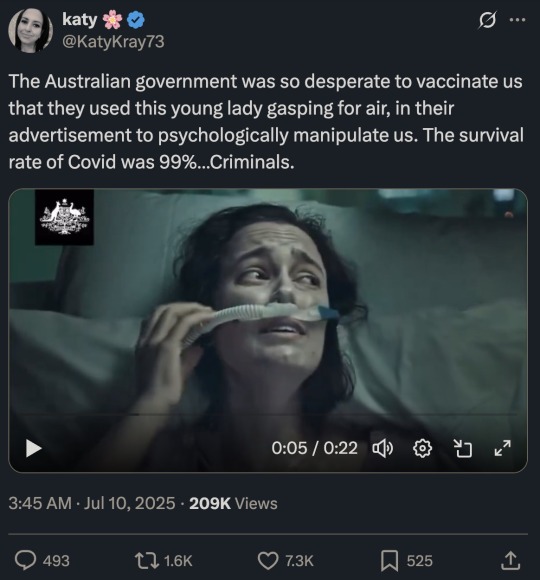



I know these people are incapable of feeling guilt or empathy most of the time, but I'm going to tell every one of them my mother died and it sucked. I don't care.
Maybe I'm trying to make sure a horrible, pointless, unnecessary death can have some meaning beyond my grief. That my mom's suffering can have some... reason.
71K notes
·
View notes
Text
My circus, my monkeys
During the pandemic, Banksy circulated a cartoon of a child playing with superhero toys. I misinterpreted his image, and thought that the child was playing with a monkey dressed as a superhero. I thought this was entirely fitting, during an era in which healthcare workers were portrayed as heroes. I thought Banksy was making some profound statement about monkeys in healthcare, which to me was outrageously hilarious and also communicating some complex profound truth. Exactly what that truth was, I am not absolutely sure but there was definitely some depth to whatever statement Banksy was making. Mostly, I thought it was exceedingly funny.
I posted this to my Facebook feed whereby it was highlighted to me that this was not a monkey, but a nurse. This was an image of a nurse dressed up as a superhero. Actually, this was an image of a nurse that looks like a monkey dressed up as a superhero. Am I suggesting that healthcare professionals are monkeys? Not at all, although as with all rules, there are always exceptions. Where in this story does the anthropoid primate feature? Be patient, and you shall see the ape emerge.

I dislike the labelling of healthcare workers as heroes for so many reasons. And this forms the basis of my blog today – though I tread upon perilous grounds and wage war with the egos that squirt obscure liquids out the ends of sharp objects intended to sedate or confuse their prey into acceptance.
A colleague and dear friend of mine opened a discussion on this topic which presented me with a new perspective that I had not yet considered. The concept of a hero is someone with extraordinary powers, who sacrifices themselves for the well-being of ‘good’. And who decides what this good is? A hero has been gifted something supernatural. A hero is more than human. Healthcare workers are no such thing, and labelling us thus detracts from the years of training we undergo in various specialities, the role of the nurse or doctor as a professional who has strived, studied, collaborated with peers, been mentored and nurtured by seniors and likewise has nurtured and mentored juniors in turn. It removes us from the workplace safety requirements we deserve, the breaks, the days off, the holidays, the ongoing support and the mental breakdowns we need. Against what I am sure is intended, the term trivialises us to a realm of ‘mysterious’ and ‘superhuman’. What we actually need is to be recognised as human. To be treated as human. To be respected, as human.
This was not the reason I so dislike the term, but it certainly adds to my perspective on this label. My problem with the concept of ‘heroes’ in healthcare is that it divides us. This term does not resonate with people who feel insecure in their skill and knowledge (I admit to being this person, and in such an admission I recognise that this post presents an incredibly biased perspective). These people feel undeserving of the term ‘hero’ and so this compounds a sense of inferiority, reduces confidence further and promotes us to identify ourselves by the vast wealth of knowledge that we do not have. On the flip side are the healthcare workers who do perceive themselves as heroes, who have some tendency towards a God-complex and hold their own intellect or skill as far superior than the qualities of the average person. Ironically, it is the average person whose health and well-being they must improve in order to maintain their own status.
Both of these personalities are dangerous within health care.
The person too timid and afraid of being an arse to flag concerns, or lacking confidence in our ability to identify and intervene in a potentially life-threatening situation - This person is a problem.
The person so determined to promote their own sense of grandeur that they hinder communication, they create chaos and drama where there ought to be none, and they bring the team down – This person is a problem.
Recently, I have encountered these latter personalities too frequently. I find it emotionally exhausting. I find it makes me feel smaller. And then I feel even smaller because I am so weak to be influenced by other people thus.
A few weeks ago I was involved in the care of someone in ICU. They were sedated and intubated. After an unexpected bout of violent coughing the ventilator seemed to stop delivering breaths adequately, pressures going up, oxygen levels plummeting, lots of alarms and all that nonsense. The bedside nurse hit the big red button that calls every wanker in the hospital to help (and quite a few non-wankers as well, I should add). There was a senior doctor who rushed in to help. She was clearly stressed, her face was tense but she was calm. She was clear. She was also wearing a lovely perfume I noticed, which is not part of the story at all. She disconnected the ventilator, and started bagging the patient. Somehow I had ended up next to the chest, so I had a quick listen of the patient’s chest and informed the doctor that there was no air entry. Essentially, the breathing tube was either blocked or not positioned correctly. A few brief trouble shooting moments later (nothing up on suction, no problems with cuff, seems tube markings were way off etc.) she decided to remove the breathing tube, bag-mask the patient to get the oxygen up and then re-intubate. Another senior nurse went to grab some scissors to help remove the breathing tube.
By this time the wanker alarm had summoned it’s people and approximately 98 thousand people were arriving with various degrees of enthusiasm and nosiness. Now, don’t get me wrong, the team is important. You cannot do this type of thing as a one man show. It would be a disaster. But what is important within this team is the need to talk, be gentle, be calm, work out who is the team leader, follow their lead, throw your two cents in then shut up.
Enter the hero of ICU. Another senior registrar. Also wearing nice perfume. She physically pushed past me, shoving me out of the way. Apparently, I am not any one significant playing any kind of important role in this piece. She listens to the patient’s chest and loudly announces that there is, in fact, no air entry.
Thank you. That was very helpful.
She starts barking orders despite the previous doctor already having established a plan. Now everyone is confused. The nurse who has arrived with scissors is now confused, the breathing tube’s tapes are cut and the doctor at the end of the bed has no idea if we are extubating, bagging and reintubating because actually now no one has a clue what is going on. No one is setting up for re-intubation. The patient’s oxygenation saturations are falling – during this madness they are still not breathing.
There are too many people involved at this point, there is confusion and too much noise, and so I leave. I found out later that after much fussing and dithering, and barking orders and confusion, the patient was extubated, bagged and reintubated. The patient’s breathing improved. Their oxygen levels restored. And they were fine. The OG doctor was right. She was calm. She was confident. She had a clear plan and a few people working with her on this plan. A hero emerged, turned a minor blip into chaos and madness and essentially delayed the entire process potentially leaving the patient with a protracted hypoxia. It is pure luck and good fortune that the patient had no residual damage from this exercise.
Such a hero.
This same hero posts to their Facebook wall the following summary of their shift

In another social media conversation we have another hero posting

What is this intended to mean? Is this a genuine ‘yay’ that they are excited by such violence and suffering? Are they attempting to portray how busy they, with a sardonic ‘yay’, but have thus posted the most violent images of unwell patients that they could? A not-so-gory sepsis, a late stage asthmatic patient, an aggressive and frightened dementia patient or treatment resistant depression may all be significantly more complex, challenging and time consuming to treat than these injuries. But these are not attention seeking enough, these are not shocking enough. These don’t portray cleanly how much of a hero the medical professional is.
Take a moment, please reader, to let this sink in. "I love level 6 trauma".
Ah.... what? Are you a psychopath doctor?! Do you realise that this is a human being? This is someone's baby having their body torn to shreds?
What drives this I wonder? Is it a desire to prove to the world that they are intelligent? I do not think anyone doubts the level of intelligence of these people. This is not in question. But ultimately, no one cares how intelligent you are if you display the professional insight and emotional maturity of a faecally liberated projectile-philic chimpanzee.
Is this narcissism, and these personalities genuinely think they are uniquely superior? Then why waste their talents saving the inferior population? I’m not entirely sure where this hero problem comes from. Whatever it is, it makes me angry. It makes me want to leave healthcare.
I use this as an example, and intend no specific attack on the individuals involved in these instances. This is merely a commentary on the nature of a personality type. A personality who may appear to care about you, who may appear to want what is best for the human on the other side of the suffering. But mostly, it is very important that everyone knows what a hero they are.
Perhaps you are offended by my bitterness or frustration at these characters. Perhaps you recognise this as a narrative of my own insecurities. Indeed, this certainly is this. My blog was designed to help me write. To help me process thoughts and emotions. It is a personal space, where I wish to shine a light on the dark side of nursing and healthcare. As promised in my first post, this is not what you think it is.
We are not your heroes.
Source: My circus, my monkeys
293 notes
·
View notes
Text
Also preserved in our archive
Governments around the world are afraid to address covid in any way. I wonder why? Isn't "the pandemic over"?
24 notes
·
View notes
Text
.....so apt......
Just losing track of the days ....
868 notes
·
View notes



